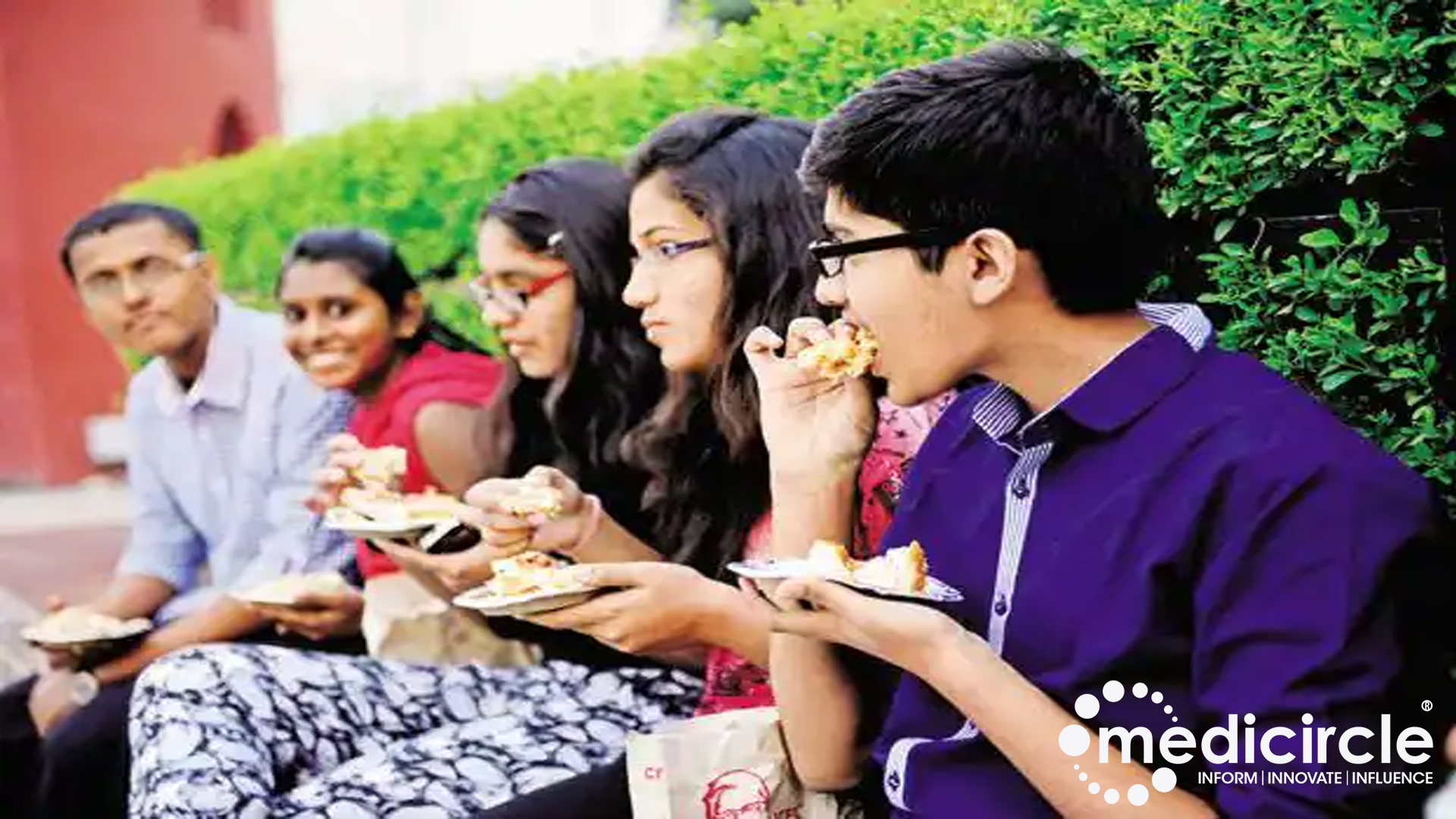In the realm of health and nutrition, understanding eating behaviours is paramount to combating obesity and related health issues. While laboratory studies offer valuable insights, real-world eating habits remain elusive. However, a pioneering project funded by the National Institutes of Health seeks to bridge this gap using AI-enabled wearable technology. Led by experts from the University of Rhode Island and The University of Texas at Austin, this ground-breaking endeavour promises to revolutionize our understanding of eating behaviours and pave the way for more effective interventions.
Unlocking the Mystery of Real-World Eating Behaviours: Nutritional studies have long emphasized the importance of eating behaviours in shaping overall health outcomes. From the speed of eating to the duration of chewing, every aspect of one's eating pattern plays a crucial role in determining nutritional status and metabolic health. However, studying these behaviours outside the confines of a laboratory setting has proven challenging, leading to a significant gap in our understanding of real-world eating habits.
Enter AI-enabled wearable technology, a game-changing tool that promises to provide unprecedented insights into real-world eating behaviours. Spearheaded by esteemed researchers Kathleen Melanson, Theodore Walls, and Edison Thomaz, this ambitious project aims to develop a system capable of accurately detecting and measuring eating motions, potentially capturing every bite and chew with precision.
The Quest for Comprehensive Data: At the heart of this innovative endeavour lies a multidisciplinary collaboration between nutritionists, behavioural statisticians, and engineering experts. Leveraging over 60 years of collective expertise, the research team is poised to tackle the complexities of real-world eating behaviours head-on. By integrating cutting-edge technology with rigorous scientific methodology, they aim to unlock the secrets of human eating patterns in unprecedented detail.
The Technology Behind the Innovation: Central to the project are two key devices: a smartwatch and a custom-made sensor designed to be discreetly worn on the jawline. The smartwatch captures the movement of the arms and wrists during eating gestures, providing valuable data on eating speed and frequency. Complementing this, the jawline sensor records jaw movements associated with chewing, offering insights into the intensity and duration of chewing motions.
Moving from Lab to Life: The study unfolds in four progressive phases, each designed to mirror real-world eating conditions more closely. Beginning with controlled lab settings, participants undergo supervised meals to establish baseline data. As the study progresses, participants transition to cafeteria-style eating and eventually to restaurant settings, where they have greater autonomy over their food choices. Throughout each phase, researchers meticulously monitor eating behaviours, capturing data on speed of eating, chewing patterns, and oral processing.
Harnessing the Power of AI: Central to the success of the project is the integration of artificial intelligence algorithms with wearable sensors. By analysing data from both the smartwatch and jawline sensor, researchers aim to develop a sophisticated system capable of detecting subtle eating behaviours with remarkable accuracy. From the rhythmic motion of chewing to the duration of food intake, AI holds the key to unlocking a treasure trove of insights into human eating habits.
Empowering Health Interventions: Ultimately, the goal of the project extends beyond mere data collection. Armed with comprehensive insights into real-world eating behaviours, researchers aim to develop targeted interventions aimed at promoting healthier eating habits. By identifying patterns associated with overeating and poor dietary choices, they hope to empower individuals to make informed decisions about their nutritional intake, ultimately reducing the prevalence of obesity and related health issues.
Cultural Sensitivity and Community Engagement: Recognizing the diverse cultural landscape of eating behaviours, the research team places a strong emphasis on community engagement and inclusivity. By recruiting participants from LatinX communities in Rhode Island and Texas, they aim to explore the unique cultural food practices that shape dietary habits. This inclusive approach not only enhances the validity of the research findings but also ensures that interventions are tailored to the specific needs of diverse populations.
A New Frontier in Health Research: As the prevalence of obesity and related health issues continues to rise, understanding the intricacies of eating behaviours has never been more critical. With the advent of AI-enabled wearable technology, researchers are poised to unlock a wealth of insights into real-world eating habits, paving the way for more effective interventions and a healthier future for all. As the journey unfolds, one thing remains clear: the quest to unravel the mysteries of human eating behaviours is just beginning, and the possibilities are endless.
http://www.21stcenturyhospitalgownplus.com/
http://www.elite-factory-15.fr/
http://www.gba-amateurboxen.de/
http://www.kita-strausberg.de/
http://sonispicehelensburgh.co.uk/
http://curryzonecardonald.co.uk/
http://cinnamon-edinburgh.co.uk/
http://www.bombaydelipaisley.com/
http://pizzanightclydebank.co.uk/
http://www.pizzanightclydebank.com/
http://gyros2goclydebank.co.uk/
http://grillicious-glasgow.co.uk/
http://www.abdulstakeaway.com/
http://www.freddiesfoodclub.com/
http://cinnamonportobello.co.uk/
http://www.romafishnchips.com/
http://bombaydelipaisley.co.uk/
http://yaraloungerestaurant.co.uk/
http://tasteofchinacoatbridge.co.uk/
http://www.memoriesofindiagorebridge.com/
http://memoriesofindiaeh23.co.uk/
http://freddiesknightswood.co.uk/
http://gyros2gohardgate.co.uk/
http://www.strausseeschwimmen.de/
http://www.janstanislawwojciechowski.pl/
http://london-takeaways.co.uk/
http://shahimanziledinburgh.co.uk/
http://freddiesfoodclub.co.uk/
http://www.spicestakeaway.com/
http://www.mexita-paisley.com/
http://pandahouseglasgow.co.uk/
http://www.zum-alten-steuerhaus.de/
http://www.oberstufenzentrum-mol.org/
http://www.morsteins-neuenhagen.de/
http://www.maerkische-jugendweihe.de/
http://www.planungsbuero-henschel.de/
http://www.hertzelektronik.de/
http://www.militaergefaengnisschwedt.de/
http://www.fahrrad-naumann.de/
http://www.hondamoto-villemomble.com/
http://www.hondamoto-royan.com/
http://www.hondamoto-ajaccio.com/
http://www.download-skycs.com/
http://www.sisakoskameleon.hu/
http://www.hondamoto-montauban.com/
http://www.hondamoto-chalonsursaone.com/
http://www.hondamoto-champignysurmarne.com/
http://www.hondamoto-asnieres.com/
http://www.pasquier-motos.com/
http://www.evacollegeofayurved.com/
http://www.compro-oro-italia.it/
http://www.hondamoto-saintmaximin.com/
http://www.hoangminhceramics.com/
http://www.pasiekaambrozja.pl/
http://www.xn--b1alildct.xn--p1ai/
http://www.ferreteriaflorencia.com/
http://www.thevichotelkisumu.com/
http://www.nexuscollection.com/
http://www.moitruongminhhuy.com/
http://www.ozkayalarpaslanmaz.com/
http://www.munkagepmonitor.hu/
http://www.my247webhosting.com/
http://www.thesmokingribs.com/
http://www.healthlabgrosseto.it/
http://www.ochranakaroserie.cz/
http://www.phukiendonginox.com/
http://www.meijersautomotive.nl/
http://www.kartaestudentit.al/
http://www.podlahyjihlavsko.cz/
http://www.hillhouseequestrian.com/
http://www.gradskapivnicacitadela.com/
http://www.capella-amadeus.de/
http://www.landfleischerei-auris.de/
http://www.faistesvacances.be/
http://www.autoservice-doernbrack.de/
http://www.tabakhaus-durek.de/
http://www.oldtimer-strausberg.de/
http://www.imexsocarauctions.com/
http://www.kaslikworkshop.com/
http://www.firefightercpr.com/
http://www.visuallearningsys.com/
http://www.hanksautowreckers.com/
http://www.impresospichardo.com/
http://www.philiphydraulics.net/
http://www.internationaldentalimplantassociation.com/
http://www.indywoodtalenthunt.com/
http://www.badicecreamgame.com/
http://www.riad-amarrakech.com/
http://www.centrodeformacioncanario.com/
http://www.socialdefender.com/
http://www.pepiniere-paravegetal.com/
http://www.reparertelephonearles.fr/
http://www.namsontrongdoi.com/
http://www.devipujakjivansathiseva.in/
http://www.laymissionhelpers.org/
http://www.vangiaphatdeco.com/
http://www.isscoachinglucknow.in/
http://www.hieuchuandoluong.com/
http://www.aurorabienesraices.com/
http://www.indianmoversassociation.com/
http://www.oztopraklarotomotiv.com/
http://moitruongnamnhat.com.vn/
http://www.dienmayvinhthuan.vn/
http://www.divadelkoproskoly.cz/
http://www.xn--12cfje1df4hdl7f1bf2evg9e.com/
http://www.westernirontrailers.com/
http://www.jazzaufildeloise.fr/
http://www.signcraft-drone.com/
http://www.realtyhighvision.com/
http://www.thermexscandinavia.nl/
http://imobiliariafelipe.com.br/
http://www.salon-lindenoase.de/
http://www.jezirka-zahrada.cz/
http://www.singhanialogistics.in/
http://www.der-pixelmischer.de/
http://www.hegermuehlen-grundschule.de/
http://www.radiologie-strausberg.de/
http://www.foto-studio-matte.de/
http://www.tables-multiplication.com/
http://www.rusztowania-belchatow.pl/
http://www.fishingandhuntingheaven.com/
http://www.orologiegioiellilameridiana.it/
http://www.rotarybresciaest.org/
http://www.jacarandaspain.com/
http://www.javieririberri.com/
http://www.huebelschraenzer.ch/
http://www.illinoiscreditunionjobs.com/
http://www.iznikdenizorganizasyon.com/
http://www.leasebackconcierge.com/
http://www.eoisantacoloma.org/
http://skullbasesurgery.co.uk/
http://www.immobilienplattensee.com/
http://www.germandailynews.com/
http://www.gptdcinternational.com/
http://www.forklifttrainingedmonton.com/
http://www.kashiwanakayama-cl.com/
http://www.thehousemediagroup.com/
http://www.pensiimaramures.ro/
http://www.michaelakokesova.cz/
http://www.viswabrahmanaeducationaltrust.com/
http://krone-aluminium.com.pl/
http://www.broadwaylumber.com/
http://www.ambulancesoccasions.com/
http://www.continuumintegrated.com/
http://www.joilifemarketing.com/
http://www.rotaseydisehir.com/

 As the prevalence of obesity related health issues continues to rise, understanding the intricacies of eating behaviours has never been more critical.
As the prevalence of obesity related health issues continues to rise, understanding the intricacies of eating behaviours has never been more critical.










.jpeg)

.jpeg)
.jpeg)
.jpeg)

.jpeg)
.jpeg)
.jpeg)
_(1).jpeg)

_(1)_(1)_(1).jpeg)
.jpeg)
.jpeg)
.jpeg)






